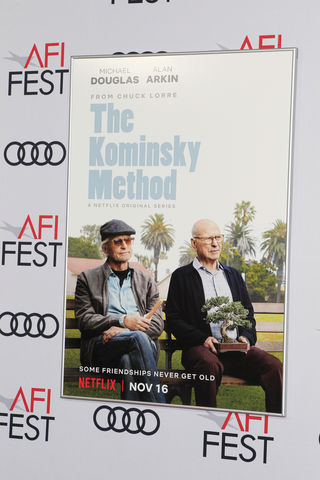Relationships
Review: The Kominsky Method, Season Two
Men growing older and wiser.
Posted November 12, 2019

While The Kominsky Method embodies its storyline in two old(er) men, its messages are ageless and universal (says this author, an older man). Chuck Lorre is the show’s creative source.
Sandy Kominsky, age 74, (Michael Douglas, who won the Golden Globe for his lead role in Season 1) was an actor, close to fame until he was not. To stay in the game, he founds an acting school (the eponymous Kominsky Method Acting Studio), where aspiring young women and men come to learn the craft of their L.A. dream.
Norman Newlander (Alan Arkin, age 80 and looking very well) was the CEO of an indeed famed talent agency. He still is in an honorific way, sort of Emeritus; he drops into his office from time to time, and continues to benefit from its profitability.
They are best friends, testy yet loving with each other, as men tend to be. Their fast-paced, often-comedic dialogues invite our minds to examine relationships (that topic has wingspan), love (filial and romantic), men and men aging, loss (of a wife and work), children (each has an adult daughter, more below about the family complexities), legal medications and drugs (alcohol and weed in California), addiction, purpose, the perils of retirement, and, to keep it light, cancer. Comedy always helps the message about decline and finitude go down—as does the redemptive arc of the series.
Season 2 immerses us in romantic love (with or without sex?) and grown-up daughters. It brings grief back into its story and sweetly surfaces the courage it takes to make amends, a fundamental principle of 12-step programs.
This season also poses the question for we boomers (or rich millennials) of whether retirement may be deadly. Perhaps that was the moral of Phillip Roth’s end-of-life story ("Living, Dying and the Moral of Phillip Roth’s Life," 8.13.2018), and surely what Bob Dylan meant when he sang, “He who is not busy being born is busy dying.” And to assure we are left unsettled, in a darkly comic way, there is the "Big C" (cancer).
First, romantic love and daughters. Norman meets, where else but at a funeral, an old flame from before he married about 50 years ago: Madelyn (Jane Seymour). She, too, is recently widowed. Their chemistry re-ignites right away. No time to waste in older age, so soon they are riding horses and a variant of that in bed.
But the spark of infatuation, even renewed, is readily dampened, in this case by Norman. This downturn happens when his 45-year-old daughter, Phoebe (Lisa Edelstein’s acting is gripping), calls to say she is coming home—now having completed her eighth drug rehab. Phoebe will arrive on the very evening that Norman has invited Madelyn over for a first dinner and overnight at his place.
The women hit it off, chatting away. But the angry, cynical side of Norman can’t be contained: He tears into his daughter for not having a life. As a psychiatrist, however, I think it is because Norman has lost his wife, his work, and, it seems, as well, his only child, a daughter. Without giving away more of the tale, let’s say this creates the path for reconciliation and redemption, for father and daughter—not to mention Madelyn.
And there also is romantic love for Sandy, who has not had a date in three months, says his 30-something, single daughter, Mindy (Sarah Baker). She manages Sandy’s acting studio and looks after her somewhat clueless dad. Mindy has news for her dad: She is not only seeing someone; she is about to move in with him.
Twice as old as her, Martin (Paul Reiser), is almost as old as Sandy, bald and with a grey ponytail. Martin is a retired, L.A. public school teacher. We are again at the dinner table, this time at Martin’s cozy home, with the wine flowing. The men, contemporaries, are having a ball reminiscing about sports, rock music... you know, guy things.
The festive mood has Sandy take out a big blunt from his pocket, to up the fun the “boys” are having. Mindy declines. But not Martin. The two boomers get as high as kites, soon giggling in a bromance that excludes Mindy. She is not a happy camper. Opening another path for reconciliation and redemption, but not without many more creative plot twists.
Back to Sandy, who runs into a recent flame, Lisa (Nancy Travis), in a supermarket aisle. He is alone, but she is with a tall, handsome man closer to her age, which is a bit less than Sandy’s. Lisa had broken up with Sandy. He has no idea why, until he later asks her: She points out that he tends to care more for himself than others (oh, there is a term for that condition, but we need not go there). Norman, however, again savoring the fruits of romance, urges Sandy to call Lisa.
“Just to say hello,” Sandy says upon calling Lisa from his car, high on weed but hands-free, upon leaving dinner with his daughter and Martin.
Lisa is again unattached and invites Sandy to visit. Platonic, she insists, as they sit on the sofa. Wine and funny conversation catalyze the ineffable we call romance. Lisa loosens up.
She declares, “Join me in the bedroom in 10 minutes.”
Which reminds him he decided not to take Cialis before entering her home. The next scene, when he goes to fetch the older man’s safety net pill from the glove compartment of his car, is hilarious. Can’t ruin that for you.
There is so much else I must omit to not preempt your viewing, as well as giving you a kindly word length for a review.
Back to Sandy, who is suffering a variety of physical ailments. He finally accedes to the pressure of family and friends. He goes to see his primary care doctor, played with deadpan hilarity by Bob Odenkirk. This doc is not keen on giving troubling information to his patients, apparently facing intractable personal problems of his own (he has a pint of whiskey and a handgun in his desk drawer).
But when Sandy demands he be straight with him, the doctor says there is a “spot on his lung x-ray.” One that does not look benign, but was probably “caught early.” Sandy is sent off to an oncologist for treatment. Recall, Michael Douglas suffered his own cancer nightmare.
This bleak news brings us to the last two of the eight episodes in season 2. The humor, always there, now turns more gallows.
Sandy has gone from denial to the second “stage of grief”: bitter anger that he has cancer and the disease and its treatments have knocked his socks off. Sandy’s daughter takes more control over the studio. Intending to keep it vibrant, she invites celebrity speakers, one being Alyson Janney (Mom, The West Wing). Sandy explodes competitively in a face-off with her. Janney is not only taller than him but also better equipped for combat.
Norman, meanwhile, is considering selling out to his partners for a huge sum of money, too much to say. To drive the narrative on, at this moment, the writers introduce Robbie (Haley Joel Osment). He is Phoebe’s son, Norman’s grandson, freshly escaped from his recent years living as a Scientologist. He is, in Norman’s view, and he should know after a career as a Hollywood agent, a “born salesman.” Norman sees the future of his agency and his own spiritual development in his grandson, which sounds a bit far-fetched, but stick with it. Robbie serves to usher in the subject of continuity in life, even a legacy, through family and enterprise.
We conclude this season with Sandy and Norman on a patio couch, in the evening light, sipping wine and exchanging barbs. They now are in their autumnal years, wondering if life may not end with death? Carnally, of course, they know and feel the encroachment of death. But what if they (we) might persist, continue on in other ways? That there may well be a life force that extends beyond our bodies is dawning in these men—and for our consideration as viewers. The season closes.
May Sandy and Norman be graced by further bodily and spiritual health, for we are left wanting more of them, their comedic drama, and the ways they surface the mysteries that infuse all our lives. Season three? Hard to imagine the actors stopping now when there is so much hope ahead.
Lloyd's latest book is The Addiction Solution: Treating Our Dependence on Opioids and Other Drugs.




